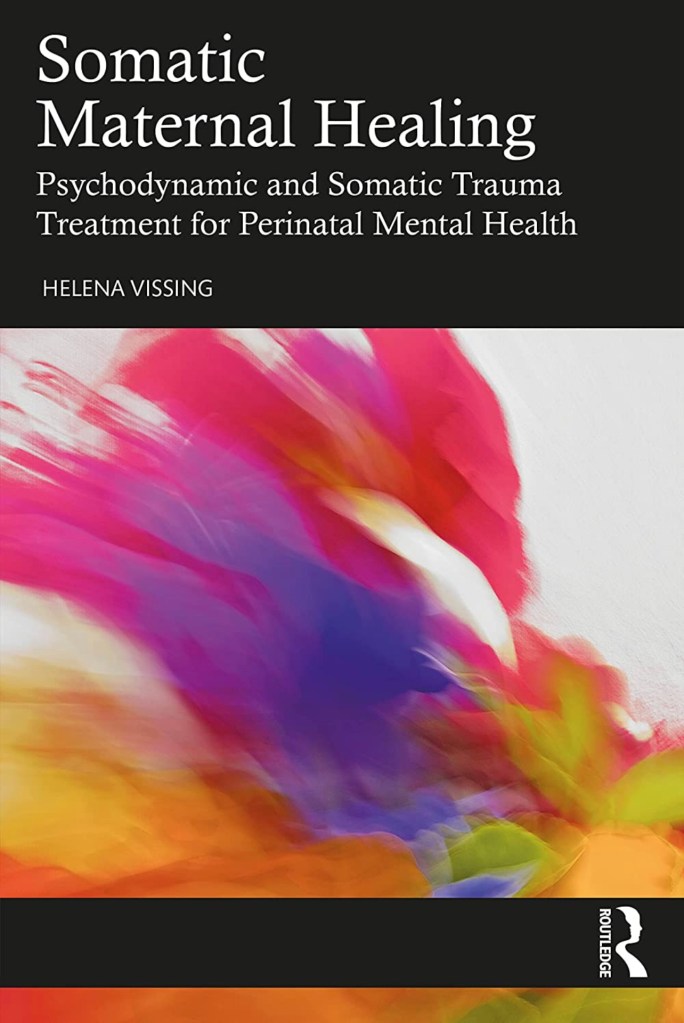
-
Spring 2024 Updates
A non-exhaustive overview of upcoming events related to my book release, CEU trainings, speaking engagements, and podcast interviews. Follow me on instagram for more updates and reflections.
A Book Was Born!
It’s been about half a year since my book, Somatic Maternal Healing, was published, and it is such a joy to see it make its way into the world, finding the people it was written for. You can listen to an interview with me about the book on the New Books in Psychoanalysis podcast. Or take a browse through the table of contents and read the introduction here. I am very grateful to Kate White who wrote a review of the book in the latest issue of the International Body Psychotherapy Journal which is open-source (including the entire archive!).
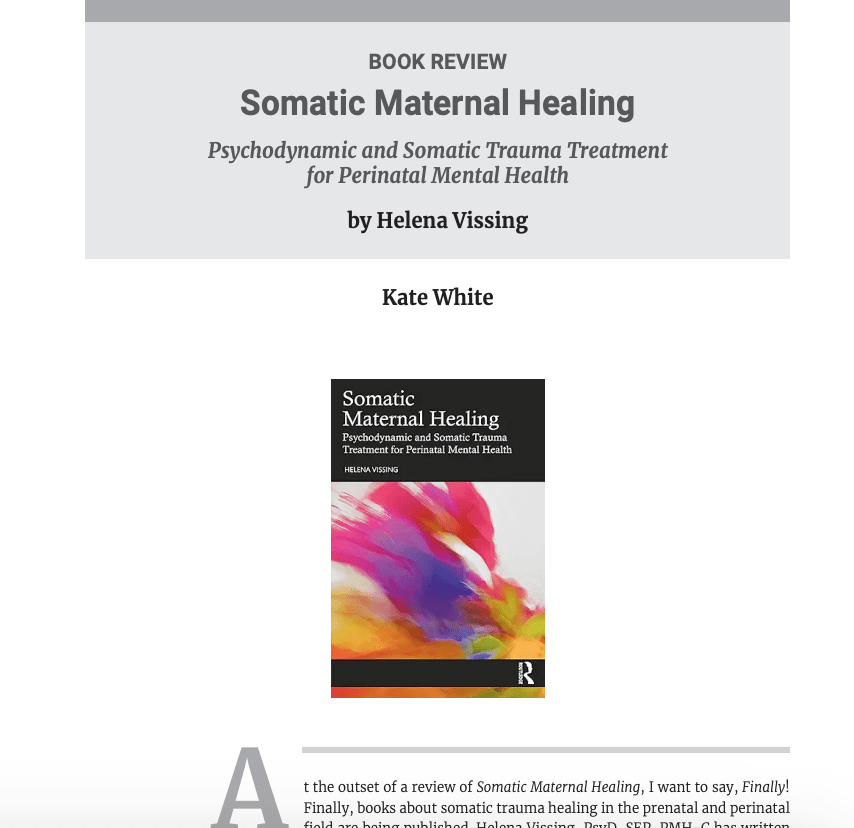
But the work of Somatic Maternal Healing doesn’t end with the book. I will start offering CEU online trainings for providers, collaborating with Nurturing Mamas Network, where I will offer an experiential and advanced training (approved for the Psychotherapy/Mental Health Track Advanced Training as well as the CEU maintenance requirement for the Perinatal Mental Health Certification).
Instead of a long 6-hour day training online, I decided to break it into Part I and II, 3 hours each. The trainings will be packed with advanced Perinatal Mental Health theory and research, experiential and somatic exercises and clinical tools, handouts, and resources. Attendees will be thoroughly prepared to offer trauma-responsive care to their perinatal clients. The first round starts June 3rd and 10th. Read more and register here.
Speaking Engagements
On May 1st, I will be speaking at “On Raising Resilience: A World Maternal Mental Health Day Event”. This event is a celebration of strength, a gathering of wisdom, and a community of support for parents and professionals alike. My presentation is titled “Maternal Bodyfulness: Somatic Tools for Empowering Your Perinatal Transition”.
On June 1st, 9 AM PST / 12 PM EST, I am honored to be a panelist on the William Alanson White Institute event titled “How Does Early Development Affect the Embodiment of the Clinical Encounter?” moderated by Doris Brothers and Jon Sletvold. This is part of a series of panels of multi-view discussions followed by audience interaction. The events are presented in collaboration with The Wilhelm Reich Center for the Study of Embodiment.
Podcasts: Interviewer + Interviewee
I have attended the previous events in the series of panels moderated by Brothers and Sletvold which have been incredibly inspiring. I am inspired and influenced by their work; I had the pleasure of interviewing them for the New Books in Psychoanalysis podcast about their book Talking Bodies. A New Vision of Psychoanalytic Theory, Practice, and Supervision.
I also enjoyed being interviewed on the Mom and Mind podcast with the wonderful Dr. Kat. Stay tuned for more podcast interviews.
-
May Updates and Events
After having spent the last year focused on writing a book, I am delighted to hit the road this Spring and Summer with conference presentations and webinars. Buckle up for a handful of exciting events and, of course, a free resource for you included!
United States Association of Body Psychotherapy Conference, San Francisco, May 18 – 21
In just a few weeks (May 21st), I will be giving a presentation at the United States Association of Body Psychotherapy conference in San Francisco. The title captures the mission of my forthcoming book as well as my current mission: “Somatic Maternal Healing: Bringing the Body into Perinatal Mental Health”. After a pandemic and a year of being in writing mode, I can’t describe how much I am looking forward to going to an in-person conference again! I am also looking very much forward to Jessica Benjamin doing the opening keynote (read my short intro to her work here). My work is deeply influenced and inspired by Dr. Benjamin’s work. She is a central thinker in modern feminist psychoanalysis, which is one of the branches of my integrative biopsychosocial model for treatment of trauma in the perinatal period.
Postpartum Support International Conference, Kansas City, June 28 – July 2
In late June, I will be attending and presenting at the Postpartum Support International conference in Kansas City. Needless to say, this is the most important gathering of Perinatal Mental Health professionals of the year. This is a conference where I truly feel like I am gathering with my tribe! I will be meeting so many wonderful people I know from this field. My session at the conference is titled “From Trauma-Informed to Trauma-Responsive: Making Perinatal Psychotherapy Whole with Coregulation”.
As a Somatic Experiencing Practitioner working to bring the body into Perinatal Mental Health, this is my favorite topic. The somatic tools of coregulation are foundational to trauma-informed care, in fact they make our work trauma-responsive, regardless of how much direct trauma treatment we are doing. All clients need and deserve therapeutic safety. The target audience for my presentation are all providers who are working in relational contexts where trauma is going to be a factor, meaning everything from the clinicians doing individual therapy to home visitators and intake technicians having the initial line of contact with clients. Attendees will walk away with a deepened focus on the nervous system aspects of building the therapeutic alliance and concrete tools for how to start practicing it today.
Psychology and the Other Conference, Boston College, October 6- 8
I just received the good news that I will be presenting at a panel at the Psychology and the Other conference in Boston. At this panel presentation, I will be in the company of some remarkable people, including Ellen Toronto who was the editor of the book A Womb of Her Own that I contributed a chapter to. Dr. Toronto has a book coming out this Summer titled “Maternal Subjectivity: A Dissociated Self-State” which I had the pleasure of reviewing and endorsing. The other panelists include Dr. Aurélie Athan and Dr. Tracy Sidesinger. You might know Dr. Athan’s work as she is nothing less than a star in maternal studies; her tireless work on matrescence and reproductive identity is shaping the development of the field. Dr. Sidesinger is a New York-based clinical psychologist that I am deeply inspired by. I can highly recommend her latest article “The Feminine Yes: Return Me to Excess” on the feminine principles of imagination, desire, and excess. Our panel is titled “M/Other: Rethinking Excess through Maternal Subjectivity”.
Webinars
I will also be doing some online presentation this Summer. August 10th, I will be doing a webinar with Somatic Experiencing International, more info to come. On August 18th, I will be presenting a webinar for the Office of Continuing Education Summer Speaker Series at The Chicago School of Professional Psychology (my alma mater if you will). The webinar is titled “From Trauma-Informed to Trauma-Responsive: Concretizing Trauma-Informed Care with Clinical Skills of Co-Regulation”. I recently also had the pleasure of doing an online presentation at the National Association of Perinatal Social Worker Virtual conference which was recorded and will become available (I will keep you posted).
Forthcoming Book
In February I submitted my manuscript for my forthcoming book, Somatic Maternal Healing. Psychodynamic and Somatic Trauma Treatment for Perinatal Mental Health. It is in production as I write and can already be pre-ordered. It has of course been a long and deep journey from its conception, gestation, and pending birth (yes, you will get ALL the reproductive puns from me!). You can rest assured I will be delightfully focused on bringing this book into the world this year, so stay tuned for more info over the next months. Don’t hesitate to let me know if you want to connect or if you have some conference or event or other project that could foster a collaboration. You know I love to speak and present and be OUT in the world to connect with our powerful communities, whether online or in person.
Free Weekly Online Somatic Meditation for Perinatal Mental Health Professionals and Birth Workers
In alignment with my mission to bring the body into Perinatal Mental Health, I offer a FREE weekly online somatic meditation every Monday at 8.45 – 9 AM PST. Find the zoom link in my instagram bio. This is a hassle-free resource: no signup needed, just show-up with or without your camera on, whether you have a moment to sit or you are going about your Monday morning. I will do a guided sensory awareness meditative exercise to get your week started off right. Please share this resource with any colleague who might be interested. I am considering offering more and longer online meditations at different times, so please let me know if you have an interest in this.
Much more to come! Don’t hesitate to reach out with any questions or thoughts. Get a monthly email with updates directly to your inbox here.
Yours,
Helena Vissing, SEP, PMH-C
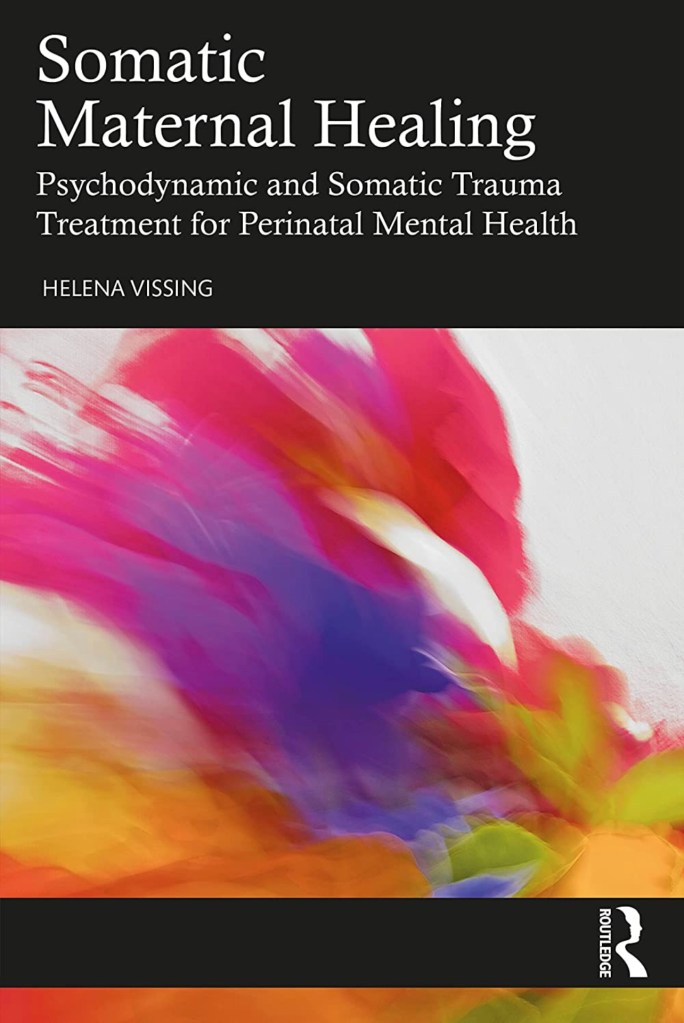
-
For Maternal/Perinatal Mental Health Professionals: Somatic and Psychodynamic Consultation
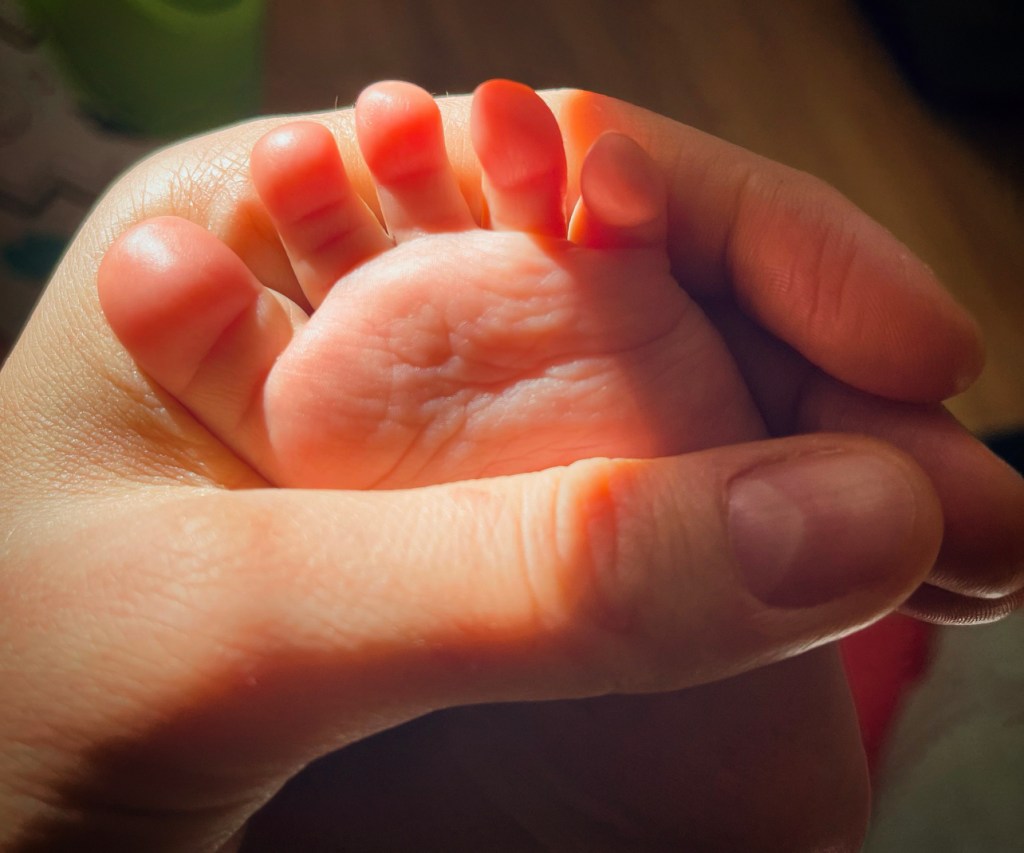
Are you a Maternal/Perinatal Mental Health Professional interested in working somatically and psychodynamically? Or interested in getting help with the somatic countertransference that comes up in your work?
I have developed a somatic and psychodynamic model for Maternal/Perinatal Mental Health which also applies to consultation. I want to listen and understand the needs of you as a provider; whether you would be interested in a somatic and psychodynamic consultation group, and if so, what you would like for the format and content.
The group would focus on somatic and psychodynamic aspects of psychotherapy with the perinatal population, especially trauma treatment. This would be regardless of the modality you are using with the clients. In other words; you don’t have to do somatic or psychodynamic work to make use of the group. You can be working with other modalities and still make use of the group to address your own regulation and countertransference.
The focus would be on supporting participants processing their own somatic experiences related to the work and help participants regulate when working through challenging cases, especially trauma work. This also means the group would focus less on background details of the case and the “basics” of Perinatal Mental Health and more on the immediate experience you are dealing with as a provider. The idea is to create a group container and make use of the healing powers of group regulation to help participants navigate and understand the intense somatic countertransference that can occur in the work.
If you are interested in this, please fill out this form.
-
January Musings. Freedom, Mutual Recognition, and Mysticism
A monthly package of musings on readings, podcasts or videos, music/art, and psychology. I muse on psychology/psychoanalysis, somatic stuff, culture and art that has touched and inspired me.
Book: “Everybody. A Book About Freedom” by Olivia Laing
This month I finished “Everybody. A Book About Freedom” by Olivia Laing. I was made aware of this book because my husband had listened to an interview with Laing on Vox Conversations (lovely podcast). The book is a unique and well-executed work of writing about pretty much everything through the topic of freedom in the widest sense and specifically bodily freedom. Laing explores the topic of freedom by examining the lives of a bunch of both well-known and lesser known individuals who impacted liberation movements in their own ways, including Wilhelm Reich, Andrea Dworkin, Malcom X, Susan Sontag (also including some personal reflections on her own life). The person who gets the most focus throughout the book is Wilhelm Reich, a radical doctor and psychoanalyst from the 2nd generation of analysts. But the book is also a crash course in several areas like the early history of psychoanalysis, the sexual liberation movement, and civil rights history.
So why do I love this book? Because Laing demonstrates with loads of fascinating historical details what we should all know already: That the fights for (all forms of) liberation are not as straight-forward as we would like them to be and that the societal as well as individual transformative work that leads to freedom is messy and ambiguous. The world cannot be divided into good guys and bad guys on the question of freedom. The peculiar life of Wilhelm Reich is an incredibly good example of this. Laing takes us on a journey through his fascinating and tragic life and draws lines to other remarkable figures who, like Reich, gave their lives to liberation movements in ways that deserve examination.
The book takes on several questions: What does it mean to feel free? What does it feel like in one’s body? How is the body a force of freedom in its own right? Or a tool for resistance? What is the relationship between bodies and freedom? Why is the body such a battlefield?
One of the things that touched me the most from the book is the notion that all forms of oppression are brutal when (or because) they turn the body itself into a prison. “The body’s needs quickly become unbearable when they are not met”, as Laing puts it. This captures the essence of Laing’s project: “The political world can make bodies into prisons, but […] bodies can also reshape the political world”, p. 244. The “problem” with the body is its vulnerability. But Laing’s project is to show us how bodies are “full of power and […] their power is not despite but because of their manifest vulnarabilities.” (p. 15).
One of the big philosophical debates Laing illuminates is whether you believe the constraints of authority put on the individual by society are preferable to what the world would look like if humans had total freedom to unfold their nature. Freud believed so, but Reich disagreed. Laing thankfully does not impose an answer on me as the reader. I did get a sense of Laing’s political and philosophical leanings as I was reading (closer to Reich than Freud, but not clear-cut), but I did not feel lectured or nudged towards any political echo chamber. Laing makes use of storytelling as a thoughtful and competent historian. Through the stories of all the people she brings to the party, I was brought to reflections and insights on my own. Refreshing indeed. Reading Laing feels more like having a thoughtful conversation. It’s not a moralizing lecture. On the contrary, Laing does not tell the reader what to think. She offers a reflective experience using stories of lived lives; specifically, the stories of bodies, in their own language, “distant from speech but just as eloquent and meaningful.” (p. 21).
Podcast: “Think About It” Episode “Great Books 18: Jessica Benjamin’s “The Bonds of Love”
In my preparations for teaching (I teach an intro to psychodynamic theories class), I was researching resources other than readings for my students and found a most excellent interview with renowned psychoanalyst Jessica Benjamin. I include texts by Benjamin in my syllabus, and while Benjamin is a great writer, this podcast is a gem. In her own words, in a warm psychoanalytic conversation with Uli Bauer, Benjamin explains her work and offers an overview of her framework.
Benjamin is arguably on the top 5 of most influential psychoanalytic thinkers of our time. She is a main contributor to the fields of relational psychoanalysis, theories of intersubjectivity, gender studies and feminism. Benjamin has examined the question of freedom and intersubjectivity in depth in her reinterpretation of psychoanalytic theory to understand the problem of domination (“Bonds of Love”). In other words, Benjamin is one of the key people who brought classic psychoanalysis into a modern egalitarian (feminist) worldview (PSA: No, Freud isn’t dead, he is more like reincarnated in a new form). I would dare to say that psychoanalysis would not have survived if it wasn’t for the feminist reinterpretation and transformation of it that Benjamin is a central representative of.
Psychoanalysis had to go through a reinterpretation for its full potential to be revealed. As Benjamin puts it, “feminism has provided a fulcrum for raising the Freudian edifice, revealing its foundation to lie in the acceptance of authority and gender relations.” (Bonds of Love, p. 7). In the authoritarian (sexist) world order, there are only the options of either domination or submission. A glaring issue with this thinking is that it overlooks the possibility of something other than the two positions of master and slave – the position of being equal subjects. This position is only possible if we can recognize each other as similar yet distinct centers of experience; subjects in our own right. Which means we need to look at the intricacies of relationships to understand any subject – as there is no such thing as a subject outside a relationship to other subjects. Benjamin explains how we must believe in the third option of mutual recognition to connect and stay true to the sharedness of our world. “If you believe in repair, you are more likely to create it”, Benjamin reminds us in the conversation with Bauer. We must believe that mutuality is an option for any repair to happen. In other words, we must believe in recognition of each other as the foundation of our subjectivity and therefore also the foundation of any repair happening between subjects.
This is a far too short introduction to Benjamin’s work and does not in any way do it justice – which is why I recommend this podcast as an excellent way to get a sense of her work and how it relates to everything from the early infant-caregiver relationship to global issues of systemic inequality. Listen to it and get a sense of why it’s so hard to come into the world, to get a sense of yourself as a subject through your caregiver’s mirroring of and difference from you, why recognizing each other as separate subjects is a paradox, and why this paradox creates tension and struggles that lead to the conflicts of inequality that have existed as long as humanity.
Music: “Vulture Prince” by Arooj Aftab
This month I also discovered the musician and producer Arooj Aftab. I know nothing about South Asian music or the Sufi music tradition Aftab’s music is part of (I understand her work is unique in her reinterpretation of an old tradition). Maybe that is why it was a touching experience to discover her album, Vulture Prince, as an outsider. Without any prior knowledge of this music style or tradition, I was taken over and into a feeling state I rarely experience.
The track “Last Night” captures this feeling the most of all the songs on the album. The lyrics seem simple but turns out to have a mesmerizing meditative effect. It’s like Aftab moves down to deeper layers of felt sense for every repetition of the same sentence: “Last night my beloved was like the moon – so beautiful”. This phrase might read like simple or even naïve poetry, but in Aftab’s voice, it becomes clear that there is a deeper meaning – or rather feeling – hidden in the words. The Sufi spiritual tradition related to this music is based on “a form of devotional Muslim poetry and song that pursues enlightenment via a deep, mystical relationship with God”. That is exactly the feeling that “Last Night” brings up in me. A feeling that this composition has more to it than the sounds. A feeling that the almost 6 minutes of this track is more like a journey down through layers of consciousness, although there will always be something left outside of the realm of consciousness. Something hidden.
“Last Night” ends with the words: “Grace far beyond my grasp – The rest is silence”. Discovering things that can bring me to that sense of appreciation and pause is rare. And it should be like that. Taking in any art, thoughts, words, idea, or creative expression that offers “grace far beyond my grasp” will never be a thing in the everyday feed, nor should it.
References
Benjamin, J. (1988). The Bonds of Love: Psychoanalysis, Feminism and the Problem of Domination. New York: Pantheon Books.
Laing, O. (2021). Everybody. A Book About Freedom. New York: W.W.Norton & Company.
-
Transitioning to New Parenthood During a Pandemic

Many new parents are just now beginning to process the experiences of having been pregnant, delivered and/or gone through the postpartum phase during a pandemic. As we are coming up on the one-year mark, it will make many pause and look back at that pregnancy and first year postpartum. This can be quite heavy when the first year of your child’s life and your parental transition, or parts of it, occurred during lockdown and a global crisis. If you gave birth during hectic circumstances where labor and delivery care was not operating as usual. It’s a big loss to be mourned. It was not the year you had expected or had prepared for (how could anyone prepare for that?). Our transition to parenthood is a multilayered process where we discover ourselves through experiences, and new parents have been so limited in their options for discovering themselves as parents during the pandemic. It is like a whole aspect of your parental identity did not get to fully unfold. This takes a big toll on parents’ mental health and adjustment to parenthood.
In terms of decision fatigue, many new parents might also be very hesitant to get too excited about how things are “getting back to normal”. It’s a very common and understandable way to protect oneself emotionally; not get your hopes too high. It’s also difficult to navigate this decision process as friends and family will be responding in very different ways. Many new parents have worked hard to find some kind of agreement on negotiating different levels of comfort or straight up conflicts around safety measures, especially with grandparents, in-laws, or other family members. This baseline that they might have spent considerable emotional effort establishing (and maintaining!) is now being challenged and “reset” and a lot of the negotiations will have to be re-established.
For new parents who have been dealing with family conflicts, it can be exhausting to even think about. We’re all frustrated after a whole year of limitations, so everyone will be eager to get what they have been longing for, making the situation ripe for conflicts. New parents often end up in the middle, trying to make all sides of the family happy while also taking care of themselves. For expecting and new parents, my recommendation is always to ensure their own basic needs first. The pregnancy and first year after birth is not just a precious time, but also a very vulnerable time. We are particularly vulnerable to the stress from conflicts during this time, as we are transitioning to parenthood.
Spring is indeed coming. But this doesn’t mean that new parents will automatically get all happy. I believe many new parents will feel mixed, understandably so. We are longing to go back to experiencing some sense of normalcy like our prepandemic lives, but if you became a parent during the last year, the pandemic has made it quite complex to understand your pre- and post-delivery life and your transition to parenthood. Without pandemics, new parents go through a natural process of comparing and processing the differences, looking back and mourning the loss of the pre-baby life while embracing and settling into the new normal with a child. This transition has become much more confusing and unclear for new parents.
I am thinking a lot about all the people who went through the transition to parenthood over the last year. It was already an intense process to become a parent; a process that requires time, space, support and compassion. The 2020-21 cohort of new parents deserve this in abundance.
#MaternalMentalHealth #PerinatalMentalHealth #Matrescence #NewMotherhood #PandemicParenting
-
Somatic Therapy for Perinatal Mental Health
As of October 2020, I completed all training modules of the Somatic Experiencing trauma treatment training program, including all requirements for consultation and personal sessions. It’s been quite a journey to go through this training program, as it is much more than just a therapy technique. It’s an entire approach for living in a regulated way. During the training program, I have been adapting and developing the techniques specifically for one of my specializations; Maternal/Perinatal Mental Health. I continue to study somatic therapy and to adapt these techniques for new parents. I have been able to share some of this work recently.
- I was interviewed for 10to12Babylounge where I offered concrete ideas for how new mothers can use somatic grounding techniques for self-regulation. Read the interview here.
- In the Spring of 2020, I did a webinar for Postpartum Support International (PSI). During the initial months of the pandemic, the majority of Mental Health Care transitioned to online/telehealth. PSI therefore launched a series of trainings titled “Teletherapy for Perinatal Mental Health”. Being experienced with both telehealth and somatic work, I offered a webinar on how to do online somatic work with new parents and how to work with grounding and self-regulation. My presentation is part of one of the webinars and is available for purchase for $30, with 20% off for PSI members and offering 2 CE hours credits. Read more here.
- I recently did a webinar for Maternal Mental Health NOW for the 2020 Webinars Series. I presented with Dr. Alyssa Berlin who is also trained in Somatic Experiencing and specializing in Perinatal Mental Health. We talked about the somatic interventions for trauma-informed Perinatal Mental Health, the connections between trauma, self-regulation, and how to work with the particular conditions of the perinatal period. Read more here.
-
Advantages of Online Therapy for Expecting and New Mothers
I wrote a piece for Motherfigure about a thing that is huge in my field and my work right now: the particular advantages of online therapy, or Telehealth, for expecting and new mothers. Motherfigure is a maternal wellness startup that combines curated products with easy-to-access info, tools, provider reviews, and community to help women navigate motherhood. Their online magazine The Mothership offers articles on childbirth, postpartum, nursing, infertility and loss and much more. Packed with both first person accounts and evidence-based information from vetted professionals. Go here to read more about online therapy for new and expecting moms and explore the wealth of resources that Motherfigure offers.
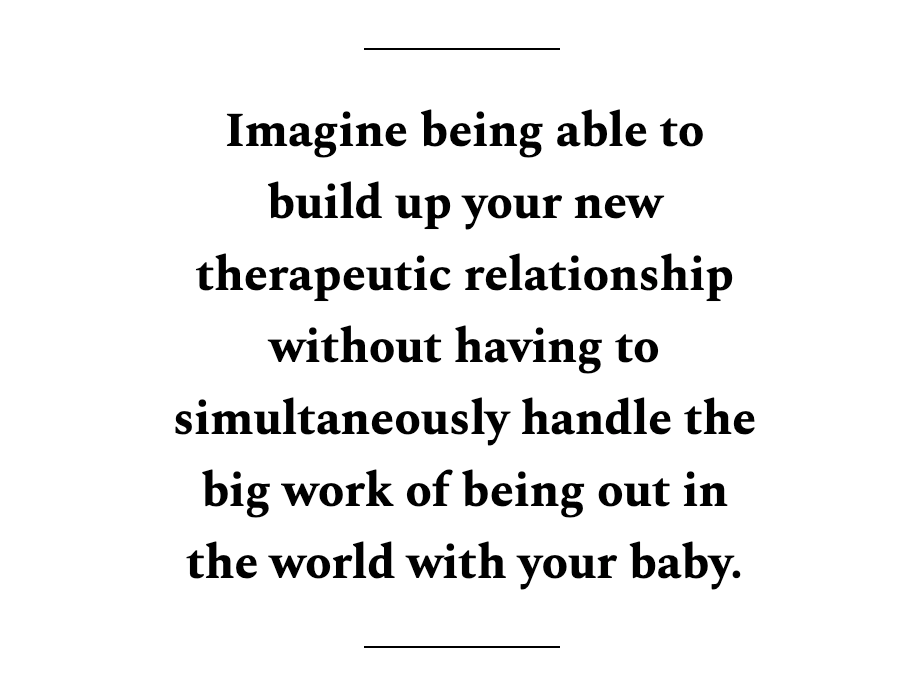
-
Postpartum Anxiety, Coronavirus, and What You Can Do
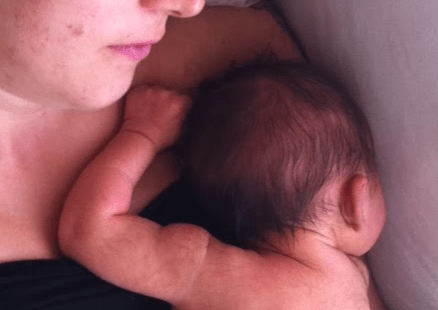
We are all concerned about the coronavirus, and none of us knows exactly what the next months or year hold. If you are a new or expecting mother, especially if you are struggling with any type or level of anxiety, the concern about coronavirus is most definitely not what you need. Because expecting and new mothers are wired to be highly sensitive to any threat to their baby. Caring for an infant is already challenging enough when it comes to illness. Going through the common cold while pregnant or with a little one in the family can be highly stressful, both because babies and pregnant bodies need extra care and because we as parents are most likely already short on the energy that caring for a sick child requires. For first-time mothers, the first round of illness in the family can be incredibly anxiety-inducing. It’s the first time, so how do you know how do understand it all and what to do, how to care for your baby? It can be like fumbling in the dark as you are figuring it out and finding what works for you. For mothers with Perinatal Mood or Anxiety Disorders (PMADs), like Postpartum Depression or Postpartum Anxiety, any kind of illness in the family can exacerbate symptoms and the feeling of overwhelm. And many mothers are either themselves dealing with serious health issues or mothering children who have them.
If you are experiencing heightened anxiety during this time, your reaction is very understandable. Anxiety is often like the tip of the iceberg, and so much is going on underneath; whatever the root of the anxiety is. You are not weak or wrong for responding with anxiety to this situation. You are responding for good reasons given what you are carrying in your body, nervous system, and mind. Being an expecting or new mother is already stressful, and this situation is particularly stressful when taking care of young ones. The good news is that children appear to be less susceptible to the virus than adults. But to a parent’s nervous system, wired for ensuring the survival of their baby, that might very well not be enough to calm down. And it’s very understandable. Especially if you are dealing with a PMAD.
Acknowledgment and nonjudgmental support is crucial when we are anxious, especially in the perinatal period. We need care and support, not shaming (whether direct or indirect) of our anxiety. We don’t need to be told neither to “stop freaking out” nor to “start taking the situation seriously” (and any scrolling on most social media is an avalanche of these mixed messages). So I am here to tell you that it is so very understandable if you are feeling anxious about the situation. The drive to protect our children and families is extra heightened during pregnancy and the postpartum period. Maybe your anxiety is related to deeper underlying issues. Anxiety can be caused by a number of things including (but not limited to) trauma, medical issues, social or relationship issues, lack of access to support and care, discrimination. But whatever the root cause, it is very understandable if this situation is triggering your anxiety during the pre- or postpartum period; when we are most raw and open and vulnerable.
I can’t tell your what the future holds for our public health, but I can tell you the good news that anxiety is treatable and can be reduced. There are many options for treatment and they need to be combined in a unique way to fit your personal needs and situation: therapy, medications, support groups, volunteer support, family or social support, yoga or other forms of movement, faith community support, online therapy, exercise, nutrition and life-style changes, getting access to community services, breathing and meditation exercises, self-regulation skills, somatic trauma therapy, addressing physical and health issues, art and creative activities, seeking experiences in nature, connecting with supportive communities.
What You Can Do
- Remind yourself that your reaction is UNDERSTANDABLE. If you have anxiety, it is no wonder that you are reacting to this situation. It would be absurd to expect you to not have a reaction. You are wired to be highly sensitive to any threats to your baby and your family’s safety. Of course you are reacting to this. And you deserve help and extra support while going through this.
- If you are working on reducing your anxiety, whether in therapy or other forms of treatment or support or by yourself, be gentle with yourself about your progress right now. Maybe you want to put your big goals a bit on hold for now? It would be unfair to expect you to progress and improve a ton and reach your goals during a time of this sudden new stressor. It’s okay. You will get there. It’s okay to put it on hold and just take it one day at a time.
- If you were wanting to reach out to your health care providers or maybe start therapy, but don’t feel safe about going to an office, consider online treatment. Online health care, or Telehealth, has pros and cons and are relevant for some. Some providers are already set up for providing Telehealth, some are in the process of it. More and more therapists are offering therapy online. Ask if your provider is certified to offer online treatment and set up for it properly. If you seek out Telehealth, ask the provider how they are determining whether it’s the right fit for you and your needs. Another form of online help is online support groups. Telehealth may or may not be a good fit for you, but you should know your options.
- If you are concerned about being in public with your baby, allow yourself to do what you need to do to make it work! So if you need to do moms groups without babies touching, that is totally understandable. If you are wanting to not shake hands with anyone at the moment, then so will it be. Don’t concern yourself with what others may think; that is their problem, not yours. If your concerns about being in public are overwhelming and limiting your life, there is treatment available. But right now might not be the time to conquer and overcome those anxieties. In time you will be able to address it and overcome and HEAL, but these are challenging circumstances. So don’t be hard on yourself.
- Reduce exposure to news and social media discussions. Prioritize a few sources of update from news outlet that you find credible and who offer concrete and useful information and guidance without sensationalism. Remember a certain portion of the media runs on over-dramatization. If certain media sources make you extra anxious, maybe mute or limit them for now. You will get the info you need without the sensationalism and drama.
Remember:
It is not your fault that you are suffering from a Perinatal Mood and Anxiety Disorder
You are not alone
With the right help you will get better
Resources:
Postpartum Support International – leading organization for Maternal Mental Health. They offer a wealth of support, including:
Sliding scale therapy directory: Open Path Collective
Bringing Light to Motherhood: Free web-based app with lots of information and concrete self-help tools for planning the postpartum period, by Maternal Mental Health NOW. Available in English and Spanish.
Motherfigure: A maternal wellness startup that combines curated products with easy-to-access info, tools, provider reviews, and community to help women navigate motherhood.
Virtual Support Groups: For a low fee, The Bloom Foundation offers virtual support groups for mothers who are unable to attend in person or prefer the online format. Different groups for Loss, NICU Moms, Perinatal Mood and Anxiety Disorders, Moms of Multiples, and Birth Trauma.
Interview with Karen Kleiman: Alanis Morissette has a podcast titled “Conversations with Alanis”, and this episode is an interview with one of the leading experts in Perinatal Mental Health; Karen Kleiman.
Mom & Mind: Podcast on Perinatal Mental Health, hosted by Dr. Kat. Many amazing episodes with supportive information about any thinkable topic related to Perinatal Mental Health.
Postpartum Stress Center instagram account: Karen Kleiman’s Postpartum Stress Center has an educational instagram account with touching “comics” about the struggles of Perinatal Mood and Anxiety Disorders. Read more about the comics and Karen Kleinman’s work here.
Maternal Mental Health Leadership Alliance: Nonprofit raising awareness about Maternal Mental Health disorders to reduce stigma and improve outcomes for mothers and babies. Their website offers a wealth of information about everything in the world of Maternal Mental Health.
-
Somatic Therapy
I offer psychotherapy from several different schools of therapy (psychodynamic, Cognitive-Behavioral Therapy, Interpersonal Psychotherapy), and I also offer somatic therapy either separately or integrated with therapy. You can read about the particular method of somatic therapy I use, Somatic Experiencing, here.
Somatic Experiencing is a trauma treatment method, but it is also effective for anxiety and self-regulation and a variety of issues. It is a very gentle approach and usually does not include touch (although some specialized Somatic Experiencing practitioners use touch. I don’t at this time). What the treatment is concretely is from the outside very similar to talk therapy: we basically sit and talk, but through guided exercises you are supported to develop body awareness, tracking of your nervous system, and grounding techniques, which can help alleviate anxiety, build resilience, and also resolve trauma.
The training is a comprehensive and intensive program including six 4-day modules (3 Beginning and 3 Intermediate), two 6-day modules (Advanced), ongoing consultation and personal sessions. I have completed all training modules and requirements for consultation and personal sessions.
Somatic Experiencing integrate well with talk therapy. It brings in what is happening in the nervous system and the body, which is a crucial part of any psychotherapy meaning-making. I adjust the somatic techniques to your needs and goals.
